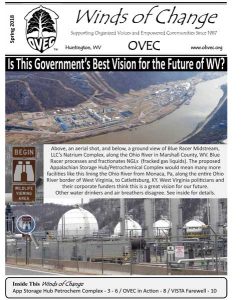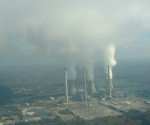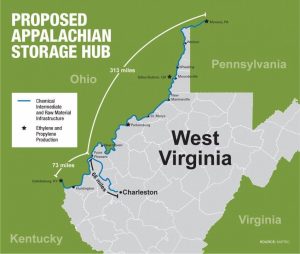Upon reading this article, Will China’s Appalachian Gas Investments Survive Trade Fight?, OVEC member Mary Wildfire was dismayed to find there was no means to comment upon the article, so she directly e-mailed the author, and shared her e-mail with OVEC’s staff. Now we are sharing it with you, below.
Whenever you read an article that touts fracked gas, pipelines, the “Shale Crescent,” and/or the proposed Appalachian Storage and Trading Hub (ASH, a massive petrochemical complex) without mentioning the downsides, please do comment below the article, if that feature is available. Write letters to the editor, too! If you are incensed by ASH and all the other fracking-related inundation of our communities and want to do more to help get our side of the story out, please e-mail vivian@ohvec.org.
—-
 Mr. Behr, I’m writing in response to your piece in E & E because it made me very angry and there isn’t a comment section. I live in West Virginia. Is it news to you that not everyone here thinks building Cancer Alley #2 along the entire Ohio River border of our state would be wonderful? Yes, there would be jobs, and some tax revenue for state and local governments. But:
Mr. Behr, I’m writing in response to your piece in E & E because it made me very angry and there isn’t a comment section. I live in West Virginia. Is it news to you that not everyone here thinks building Cancer Alley #2 along the entire Ohio River border of our state would be wonderful? Yes, there would be jobs, and some tax revenue for state and local governments. But:
- How many jobs is disputed and
- There is the question of how many would go to state residents, and
- The tax revenues would soon be slashed thanks to lobbying. Further,
- This project is intended to get rid of some of the glut of natural gas from the Marcellus and Utica shales which is keeping prices low here—and so are the many pipelines heading east, south and north, likely for export. Great for the industry. NOT so much for people paying gas bills, and not for people unfortunate enough to live where pipelines run, near a storage hub or compressor station or gas well or cracker plant or chemical or plastics factory. Besides,
- It’s all predicated on decades’ worth of cheap gas, but there are questions about how much gas is really down there. See David Hughes’ Shale Gas Reality Check, a comprehensive, well-by-well analysis of the real prospects for abundance into the future. And now consider that
- Pipelines leak, polluting water; sometimes they explode or create fires. Compressor stations emit air pollution and noise.
- Cracker plants create all kinds of pollution, and raise cancer rates, as do plastics plants (especially for workers); this area already has high cancer rates, and Parkersburg and Pittsburg already have serious air pollution problems.
- If built, the glut will be eased which will lead to more drilling and fracking, with a well-known complex of harms to local people and the environment
- The complex is supposed to produce plastic—but people are becoming aware of the nasty problem of plastic pollution of the ocean; a young but rapidly growing anti-plastic movement may reduce demand.
- All of this will add to the problem of climate change. Admittedly, this problem won’t do anything more serious than destroy civilization, possibly cause human extinction, and leave any future generations hating their ancestors as no generation has in all of human history, so no real need to mention something so trifling.
- There is an assumption that West Virginians will happily trade all of the above harms, and a few I’ve left out, for the jobs and revenue mentioned. And many would. But fact is, we’ve had a full century of schooling by the coal industry in how that plays out: WV is either dead last, or 49th in just about every measure of well-being.
Mary Wildfire
We can do better for West Virginia than a massive petrochemical complex! Get active for a better future! Join and volunteer with OVEC, and/or join other local groups working for a sustainable, regenerative future.










